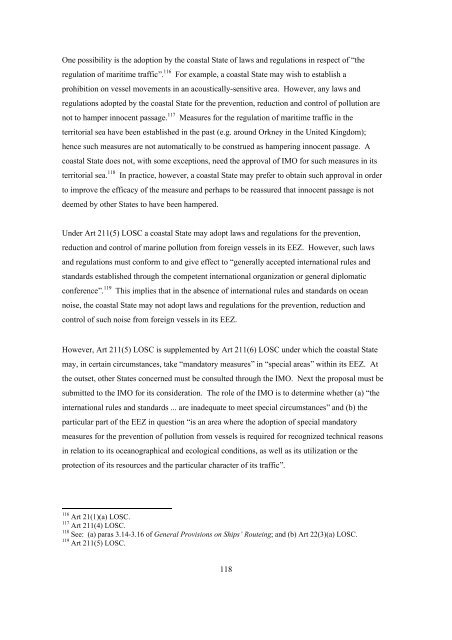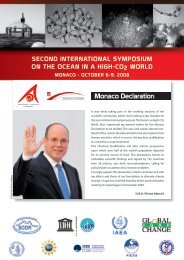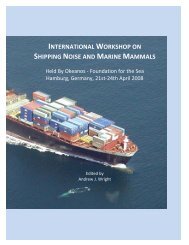coastal States”. This formulation suggests that the “pollution damage to the related interests <strong>of</strong>coastal States” must arise from threat <strong>of</strong> accidents. If so, the applicability <strong>of</strong> this part <strong>of</strong> Art211(1) LOSC to ocean <strong>noise</strong> is doubtful, in that ocean <strong>noise</strong> is more typically a product <strong>of</strong> routineoperations rather than <strong>of</strong> accidents. 111 The IMO’s General Provisions on Ships’ Routeing 112appear to support the former interpretation, since the term “routeing system” is defined as “[a]nysystem <strong>of</strong> one or more routes or routeing measures aimed at reducing the risk <strong>of</strong> casualties ...”(emphasis added). 113Art 211 LOSC goes on to place duties on flag States <strong>and</strong> give qualified powers to coastal States.Under Art 211(2) LOSC, flag States are to adopt laws <strong>and</strong> regulations for the prevention,reduction <strong>and</strong> control <strong>of</strong> pollution <strong>of</strong> the marine environment from their vessels, <strong>and</strong> these are tohave at least the same effect as that <strong>of</strong> “generally accepted international rules <strong>and</strong> st<strong>and</strong>ardsestablished through the competent international organization or general diplomatic conference”.In the current absence <strong>of</strong> such rules <strong>and</strong> st<strong>and</strong>ards in respect <strong>of</strong> ocean <strong>noise</strong> from vessels, theimpact <strong>of</strong> this duty is clearly limited. Nevertheless, the duty on flag States to adopt laws <strong>and</strong>regulations remains applicable, <strong>and</strong> flag States should therefore be encouraged to take unilateralaction with regard to <strong>noise</strong> as a pollutant.Under Art 211(4) LOSC, a coastal State may adopt laws <strong>and</strong> regulations for the prevention,reduction <strong>and</strong> control <strong>of</strong> marine pollution from foreign vessels in its territorial sea. 114 However,such regulations “shall not apply to the design, construction, manning or equipment <strong>of</strong> foreignships unless they are giving effect to generally accepted international rules or st<strong>and</strong>ards”. 115Since some solutions to ocean <strong>noise</strong> from vessels are likely to lie in design, construction orequipment <strong>and</strong> IMO rules <strong>and</strong> st<strong>and</strong>ards in this area do not currently exist, the coastal State mustcurrently find other ways <strong>of</strong> managing ocean <strong>noise</strong> in its territorial sea.111 In this respect, ocean <strong>noise</strong> shares similarities with many other forms <strong>of</strong> pollution fromvessels, e.g.: operational oil pollution, operational chemical pollution, air pollution, pollution bysewage, garbage, ballast water <strong>and</strong> anti-fouling chemicals.112 7 th edition, 1999. Based on Resolution A.572(14) (as amended), <strong>and</strong> “established pursuant to regulationV/8 <strong>of</strong> the SOLAS Convention” (i.e. the 1974 International Convention for the Safety <strong>of</strong> Life at Sea, asamended).113 Para 2.1.1; see also para 1.1.114 See also Art 21(1)(f) LOSC, under which a coastal State may adopt laws <strong>and</strong> regulations relating toinnocent passage in respect <strong>of</strong> “the preservation <strong>of</strong> the environment <strong>of</strong> the coastal State <strong>and</strong> the prevention,reduction <strong>and</strong> control <strong>of</strong> pollution there<strong>of</strong>”.115 Art 21(2) LOSC.117
One possibility is the adoption by the coastal State <strong>of</strong> laws <strong>and</strong> regulations in respect <strong>of</strong> “theregulation <strong>of</strong> maritime traffic”. 116 For example, a coastal State may wish to establish aprohibition on vessel movements in an acoustically-sensitive area. However, any laws <strong>and</strong>regulations adopted by the coastal State for the prevention, reduction <strong>and</strong> control <strong>of</strong> pollution arenot to hamper innocent passage. 117 Measures for the regulation <strong>of</strong> maritime traffic in theterritorial sea have been established in the past (e.g. around Orkney in the United Kingdom);hence such measures are not automatically to be construed as hampering innocent passage. Acoastal State does not, with some exceptions, need the approval <strong>of</strong> IMO for such measures in itsterritorial sea. 118 In practice, however, a coastal State may prefer to obtain such approval in orderto improve the efficacy <strong>of</strong> the measure <strong>and</strong> perhaps to be reassured that innocent passage is notdeemed by other States to have been hampered.Under Art 211(5) LOSC a coastal State may adopt laws <strong>and</strong> regulations for the prevention,reduction <strong>and</strong> control <strong>of</strong> marine pollution from foreign vessels in its EEZ. However, such laws<strong>and</strong> regulations must conform to <strong>and</strong> give effect to “generally accepted international rules <strong>and</strong>st<strong>and</strong>ards established through the competent international organization or general diplomaticconference”. 119 This implies that in the absence <strong>of</strong> international rules <strong>and</strong> st<strong>and</strong>ards on ocean<strong>noise</strong>, the coastal State may not adopt laws <strong>and</strong> regulations for the prevention, reduction <strong>and</strong>control <strong>of</strong> such <strong>noise</strong> from foreign vessels in its EEZ.However, Art 211(5) LOSC is supplemented by Art 211(6) LOSC under which the coastal Statemay, in certain circumstances, take “m<strong>and</strong>atory measures” in “special areas” within its EEZ. Atthe outset, other States concerned must be consulted through the IMO. Next the proposal must besubmitted to the IMO for its consideration. The role <strong>of</strong> the IMO is to determine whether (a) “theinternational rules <strong>and</strong> st<strong>and</strong>ards ... are inadequate to meet special circumstances” <strong>and</strong> (b) theparticular part <strong>of</strong> the EEZ in question “is an area where the adoption <strong>of</strong> special m<strong>and</strong>atorymeasures for the prevention <strong>of</strong> pollution from vessels is required for recognized technical reasonsin relation to its oceanographical <strong>and</strong> ecological conditions, as well as its utilization or theprotection <strong>of</strong> its resources <strong>and</strong> the particular character <strong>of</strong> its traffic”.116 Art 21(1)(a) LOSC.117 Art 211(4) LOSC.118 See: (a) paras 3.14-3.16 <strong>of</strong> General Provisions on Ships’ Routeing; <strong>and</strong> (b) Art 22(3)(a) LOSC.119 Art 211(5) LOSC.118
- Page 2:
Oceans of Noise 2004A WDCS Science
- Page 8 and 9:
In the US, the deployment of Low Fr
- Page 10 and 11:
its propagation beyond those declar
- Page 12 and 13:
The best evidence for noise being f
- Page 14 and 15:
Box 1. Characteristics of sound / l
- Page 16 and 17:
Sound speed (c)The speed (c) of a w
- Page 18 and 19:
Box 2. The effects of temperature,
- Page 20 and 21:
2.1.2. Measuring sound intensityIde
- Page 22 and 23:
i.e. Equal pressure measurements di
- Page 24 and 25:
Spherical or Geometrical spreading
- Page 28 and 29:
5.0 145Tug pulling loaded barge 1.0
- Page 30 and 31:
The source used during 3-D surveys
- Page 32 and 33:
Machinery noisePropulsion machinery
- Page 34 and 35:
Man-made islands /caissonsFixed pla
- Page 36 and 37:
12 3245Drill bit6Figure 3.4. Sound
- Page 38 and 39:
Transientnoise sourcesAircraftHelic
- Page 40 and 41:
Results from the aerial surveys con
- Page 42 and 43:
haemorrhaging in the inner ears and
- Page 44 and 45:
However they also noted that whales
- Page 46 and 47:
4. The Use of Sound by CetaceansChr
- Page 48 and 49:
seems logical, therefore, that if t
- Page 50 and 51:
However, despite the reported low a
- Page 52 and 53:
Kamminga and Wiersma 1981;Akamatsu
- Page 54 and 55:
SongSocial callsShrieksSlaps0.03-80
- Page 56 and 57:
anthropogenic factors that make the
- Page 58 and 59:
5.3 Longer-term impactsNoise is cle
- Page 60 and 61:
5.4 Indirect impactsThe above impac
- Page 62 and 63:
decompression sickness (DCS) as see
- Page 64 and 65:
6. Examples of regional and nationa
- Page 66 and 67:
6.3 ASCOBANS and ACCOBAMSTwo region
- Page 68 and 69: implications and the discussion sho
- Page 70 and 71: 7.1. Consideration of Voluntary vs.
- Page 72 and 73: acoustic measurements have been mad
- Page 74 and 75: 7.6. Methods of protectionComplianc
- Page 76 and 77: 7.6.1 Monitoring7.6.1.1 Visual, aco
- Page 78 and 79: Delory et al. (2002) use Ambient No
- Page 80 and 81: 8. ReferencesAburto, A., Rountry, D
- Page 82 and 83: Caldwell, M.C., Caldwell, D.K., and
- Page 84 and 85: Engas, A., Lokkeborg, S., Ona, E. a
- Page 86 and 87: IWC 2002b. Report of the Scientific
- Page 88 and 89: McCauley, R.D. 1994. Seismic Survey
- Page 90 and 91: Potter, J. and Delory, E. 2001. Noi
- Page 92 and 93: Smolker, R.A., Mann, J. and Smuts,
- Page 94 and 95: Watkins, W.A. 1981b. The activities
- Page 96 and 97: ANNEX 1The Application of Marine Po
- Page 98 and 99: an important factor. 13 The judgeme
- Page 100 and 101: in the preparatory work of the LOSC
- Page 102 and 103: practice by the UNEP Governing Coun
- Page 104 and 105: protection and preservation of the
- Page 106 and 107: than international rules, standards
- Page 108 and 109: Four of the twelve regional seas tr
- Page 110 and 111: seismic operations in the Protocol
- Page 112 and 113: ConclusionAt the global level, only
- Page 114 and 115: Art 209 LOSC focuses on both standa
- Page 116 and 117: No State Party may impose condition
- Page 120 and 121: If the IMO makes this determination
- Page 122 and 123: estrictions to vessels operating in
- Page 124 and 125: In the EEZ, in comparison to the te
- Page 126 and 127: Appendix A - Some international ins
- Page 128 and 129: Convention for the Protection of th
- Page 130 and 131: Available at:http://www.unep.ch/sea
- Page 132 and 133: BucharestConventionArticle XIPollut
- Page 134 and 135: environment1. The Contracting Parti
- Page 136 and 137: - that under Article III.8.c) of AC
- Page 138 and 139: e) no sudden or repeated change in
- Page 140 and 141: Ref: Nowacek et al. 2001.Location:
- Page 142 and 143: Location: Arctic• Vocal behaviour
- Page 144 and 145: • Vaquita surfacing duration and
- Page 146 and 147: • 6% of small delphinids (n=264;
- Page 148 and 149: Species type: Boto, Inia geoffrensi
- Page 150 and 151: • Humpback whales appeared tolera
- Page 152 and 153: • Behaviour interpreted as aggres
- Page 154 and 155: • There was no evidence of minke
- Page 156 and 157: • Northern right whales may be ap
- Page 158 and 159: • Migrating gray whales disturbed
- Page 160 and 161: to Ensenada De La Paz, Mexico. Aqua
- Page 162 and 163: distribution of humpback whales, Me
- Page 164 and 165: Richardson, C.R. Greene, C.I. Malme
- Page 166 and 167: Zhou, K., Pilleri, G. and Li, Y. 19
- Page 168 and 169:
6. surveys for Cuvier’s beaked wh




